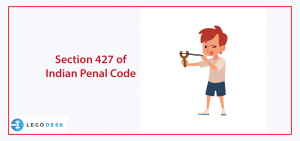Section 427 of Indian Penal Code
INTRODUCTION
Section 427 of the Indian Penal Code punishes him who commits mischief and causes loss or damage of 50 rupees or more to another. He shall be punished with simple or rigorous imprisonment for a term extending up to two years, or with fine, or with both.
Section 427 IPC reads as follows:
“Whoever commits mischief and thereby causes loss or damage to the amount of fifty rupees or upwards shall be punished with imprisonment of either description for a term which may extend to two years or with fine, or with both.”
To get a better understanding of Section 427, will first know the meaning of ‘mischief’ in the Indian Penal Code. Mischief is a criminal offence, defined under Section 425 of Indian Penal Code.
SECTION 425 OF INDIAN PENAL CODE IN BRIEF
According to Section 425 of the Indian Penal Code, whoever knowingly causes any loss or damage to any person either through destruction of any property or causes change to any property which destroys or diminishes its value or utility, or affects it injuriously, commits the offence of “mischief.” In order to hold a person guilty under Section 425 of IPC, it is not necessary that the offender intends to cause loss or damage to the owner of the property that has been injured or destroyed. It will be sufficient if he intends to do so, or he knows that he is likely to cause the wrongful loss to a person.
Therefore, 2 main points have to be proved before holding any person guilty of the offence of mischief:
- Proper knowledge and intention
- Wrongful loss or damage caused to any other person,
Let’s understand this with the help of an example; Shivam intentionally throws away some valuable possessions in a river which were held by Krishna in order to deteriorate him. In this example, Shivam has committed mischief.
SECTION 427 OF INDIAN PENAL CODE IN BRIEF
Now coming back to Section 427 of Indian Penal Code, the main point to be considered is that the loss or damage caused as a result of the mischief committed by the accused amounts to fifty rupees or more. The actual loss or damage caused should be taken into account while assessing for damages. Any damage or loss in consequence of the act cannot be taken into consideration while assessing. The penalty under this section is more stern and serious than under Section 426 of Indian Penal Code which provides for punishment for mischief.
The offence under Section 427 is non-cognizable, bailable and compoundable when the only loss or damage caused is loss or damage to a private person, and is triable by any magistrate.
CASE STUDY
In the case of Kashiben Chhaganbhai Koli Vs. State of Gujarat [2008] INSC 2089 (4 December 2008), the appellant was charged with having committed an offence under Section 427, 504, and Sections 3(i)(x) of the Atrocities Act. The facts of the case are as follows:
The appellant or the original accused was the owner of agricultural land of village Paniyari in Taluka Vyara. She, the appellant entered into an agreement with the complainant to sell the land to the complainant for Rs.1,45,000/-. The complainant initially paid a sum of Rs.40,000/- via cheque. He thereafter paid another sum of Rs.60,000/-and entered into writing for the sale of the land, and the appellant agreed to hand over possession of the land in question. As per the complainant, after paying a further sum of Rs.60,000/- he was given possession of the land by the appellant.
The complainant had withdrawn water from the Irrigation Department for which he produced a proof on record. He was cultivating the land and had cultivated sugarcane crop on the land and sold the sugarcane to Ukai Region Cooperative Sugar Industry. He had left the field open for the growth of the plants. As a result of the actions of the accused, the complainant filed a Civil Suit seeking an injunction, and the Court had granted an ex-parte interim injunction. On 24th January 1995, i.e., after about 8 to 10 days from the order of the court, the accused illegally and forcibly tilled the land. He had used tractors to commit substantial loss of crop to the complainant. In order to resolve the dispute, he approached the accused, but she did not give any reply. He, therefore, filed a case on 1st February 1995. He also stated that when he had gone to meet the accused in order to resolve the dispute, the complainant had used insulting and derogatory words against him — order to bad and insulting language.
In an appeal, the Gujarat High Court established that the conviction was to be made in terms of Section 427 Indian Penal Code and Section 3(i)(v) of the Atrocities Act. The High Court was justified in holding the accused guilty of an offence punishable under Section 3(i)(v) of the Act and under Section 427 of Indian Penal Code. Clearly, the appellant had destroyed the sugarcane crops of the complainant using a tractor and was held guilty. Hence the appeal was dismissed.
Try our Debt Resolution solutions today Request a Demo
